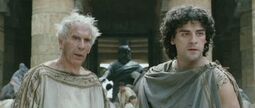Hypatia (Between 350 and 370-415 AD), a famous female philosopher, mathematician, and astronomer in the ancient West, was active in Alexandria, the cultural center of the late Roman Empire. It is said that the woman in white in Raphael's famous painting "Athens Academy" is her. Hypatia's father and mentor, Theon, was the last mathematician in the world-famous Alexandria Library. Around 400 AD, Hypatia became the leader of the Platonic School of Alexandria by virtue of her outstanding knowledge. In addition to her personal research, she is also enthusiastic about teaching. Her reputation has attracted both foreign students who are eager for knowledge and arty dignitaries. Although all her own writings are lost, her image of wisdom has to be passed down for thousands of years from the records of her contemporaries. There are also legends about her beauty and her tragic death.
"City Square (Agora)" is a Spanish film that takes Hypatia as the protagonist and focuses on portraying its tragic ending. Agora is a Greek word, literally translated as city square. The city squares of ancient Greek city-states were places where citizens gathered for discussion, so agora contained the meaning of public political space. In the film, it was the fanatical crowd gathered on the city square that ultimately led to the destruction of the Alexandria Library and Hypatia, which were symbols of Greek civilization. The film is titled Agora, and that's probably what it means.
The film shows the social picture of Alexandria at the end of the fourth century and the beginning of the fifth century, in which the fanaticism of the masses stems from the rapid development of Christian faith. The persecution that has lasted for centuries since its inception has not dismantled Christianity, on the contrary, it has continuously stimulated its sometimes slack nerves and helped it overcome internal divisions. By the late fourth century, the original state religion of the Roman Empire, polytheism, was dying, but Christianity, like the rising sun, had the potential to sweep the empire. The last Roman emperor Julian who believed in polytheism died in the Persian battlefield in 363 AD, and Theodosius the Great finally declared Christianity the state religion of the Roman Empire in 380. In this kind of social background, the Alexandria Library as a symbol of paganism and the philosophy taught by Hipatia could hardly be seen by Christian believers whose religious passions are increasing day by day. Although there are many famous Christians among the students of Hypatia (such as Synesius, who later became the local bishop of Thoromes), the fanatical crowd never succumbed to logic. The influence of Orestes (in the film he is a student and admirer of Hypatia) has become an obstacle to the expansion of Bishop Cyril's power. As a result, the Library of Alexandria was eventually destroyed, and Hypatia could not escape the mob's poisonous hands.
The main line of the film revolves around Hypatia's activities, mainly including her teaching and research activities and resistance to religious fanaticism (whether polytheistic or Christian). There is also interspersed with the famous legend of her categorically rejecting the suitor with her menstrual cloth. In the film, Orestis, who later became the governor, acted as the failed suitor. Another clue of the film revolves around the fictional character Daus. Daus is a slave of the Hypatia family, and has been secretly admiring and admiring the mistress, but his status as a slave is an insurmountable gap. At the same time, Christianity, which promotes brotherly love, gradually attracted him (this is also an important reason why Christianity has developed rapidly among the lower classes). Facing the conflict between love and faith, he finally chose faith. However, while the Christian faith brought him freedom, it also involved him in constant religious vendettas. As he became increasingly confused about his beliefs, he learned that the next target of murder was Hypatia. Although he tried to save her, he was unable to do anything in the end. In addition, Daus' silent admiration for Hypatia also contrasts with Oestes' aggressive courtship. The film echoes each other with the two clues of Hypatia and Daus, showing the spiritual conflicts and real dilemmas encountered by people in the era of drastic changes.
From the perspective of the story outline, the development of the plot should be quite tense, but the actual feeling of watching the movie is not like this. The biggest problem is that the plot of the film is slightly broken and the conflicts lack strength. The contradiction between rationality and religious fanaticism throughout the film should have been the driving force of the main line of the film. However, the part of the film that depicts Hypatia’s exploration of geocentric theory is complete in its foreshadowing and advancement, but it is free from the development of the main contradiction. . As a result, as soon as the movie enters the relevant passages of Hipatia's scientific exploration, it seems to have entered a paradise, and the plot clock has stopped moving. As for the film's secondary line, the main problem lies in the lack of strength in contradictions. In the film, whether it is the suffering caused by Daus' slavery status or the attraction of Christian brotherhood to him, although there are manifestations, they are always on the surface. Moreover, Hypatia's care and appreciation for him actually eliminated the difficulty of making a choice set for him by the film to a considerable extent. These problems make the film's arrangement of his fate appear too deliberate, and also weaken the intensity of his inner conflict. In addition, his love for Hypatia shown in the film through his behavior is not even as good as Oritis. After all, Oritis still refuses to betray Hypatia under the tremendous pressure from Cyril face to face. What Daus did was just to help her die happily.
The film focuses on the conflict between the fanaticism of Christian believers and the rationality of Hypatia and her representatives. However, the depiction of this contradiction may not completely conform to historical facts. You must know that Greek philosophy is not completely independent of religious beliefs. The Library of Alexandria itself assumes the religious functions of polytheism rather than a library in the modern sense (the sacrificial ceremony held in the library at the beginning of the film also reflects this). The philosophical school to which Hypatia belongs may also be neo-Platonism full of mysticism. From a historical point of view, it is hard to say that the reason Hypatia upholds is not mixed with religious beliefs. However, the film evades her attitude towards polytheism in the portrayal of Hypatia, especially after her confession to Cyneths-"I must doubt"-almost made her an atheist. Of course, movies are not historical works, and simplification of contradictions can sometimes help highlight themes and characters. However, if the complexity of reality contradictions is fully depicted, it may also bring richer and deeper meaning to movies.
Although Hypatia’s rationality is not rational in the modern sense, if we go to the other extreme, completely understanding the opposition between Hypatia and Christian fanaticism as a conflict between two different religious beliefs may also simplify the problem. This understanding is tantamount to completely denying the historical roots of modern reason, and it cannot change the harsh nature of the atrocities committed against Hypatia. Regarding the death of Hypatia, historical records are far more brutal and cruel than the arrangement in the movie. Edward Gibbon (Edward Gibbon) in his "The History of the Decline and Fall of the Roman Empire " on the Hypatia following statement:
"mathematician Hypatia, daughter of Aung seats, the doctrine of enlightenment by his father, her profound commentary, An accurate and complete interpretation of the theories of Apollonius and Diophantus; she also lectured publicly on the philosophy of Aristotle and Plato in Athens and Alexandria. This humble virgin looks like a spring flower, but has mature wisdom. , She refused the love of her lover and taught her disciples wholeheartedly. The most glorious and prominent figures all couldn’t wait to visit this female philosopher. But Cyril stared at the door of her lecture office with jealous eyes. The crowds of crowns covered chariots and slaves. So the rumors among the Christians quietly spread. They said that the daughter of Shion was the only stumbling block in the handshake between the Roman official and the archbishop. This stumbling block was quickly removed. On a fatal day, during the sacred Lent period of Lent, Hypatia was torn out of her two-wheeled cart, and the clothes were torn apart, dragged all the way to the church, where she was caught by the worship reciting priest Peter ( Peter the reader), a group of barbarians and cruel fanatics slaughtered to death inhumanely with their bare hands. The sharp clam shell scraped her flesh from the bones, and her trembling limbs were thrown into the fire. Justice His investigation and punishment were finally abandoned due to a timely gift, but the murder of Hypatia has imprinted an indelible stain on Cyril’s personality and beliefs in Alexandria.” (quoted from Wikipedia "Hipatiya" Chinese entry)
From this we can know that such murders were still regarded as shameful crimes at the time. Unfortunately, when Christianity finally consolidated its dominance, the cruel and atrocities against heretics became praiseworthy. In fact, in the seventh century AD, the church figures about Hypatia had already portrayed her as a witch-like figure, and regarded her murder as "the last poison that destroyed the idolatry in Alexandria" (return (Quoted from the Chinese entry of "Hipatiya" on Wikipedia). Naturally, religion itself can never kill people, but fanatical religious believers can. They are not only fanatical religious believers. Many fanatical followers of theories under the banner of "truth" and "science" have also committed numerous crimes in history. Their enthusiasm stems from the imprudent affirmation of the objects they believe in. This imprudent and therefore easy affirmation closes their minds and makes them willing to accept ready-made explanations and refuse to doubt. What's more, they not only refuse to doubt themselves. And hostile to all objections. Ever since, no matter how beautiful religion or theory is, it is inevitable that dragons will be planted to harvest fleas. Nevertheless, for people who are burdened with heavy real life, all kinds of beliefs in authenticity and falsehood still attract them with all kinds of promises and all kinds of temptations. The famous novel "Where Are You Going" by the Polish writer Sienkiewicz describes the protagonist's difficult pursuit of faith in the era of persecution of Christianity. However, the lost lambs must be careful. When a strong faith must be manifested in blood, you should also ask it: Where are you going?
View more about Agora reviews











